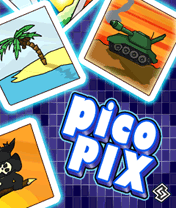
When poor old Rolf Harris finally pops his clogs, there are a few phrases that will echo around his name for all eternity (amidst the faint sound of wobbling saws).
The first of these concerns the imprisonment of kangaroos, but it's his other favourite catchphrase that we're concerned with today. Many of you may have childhood memories of Rolf appearing on TV, furiously scribbling away at a easel-mounted piece of paper repeating, mantra-like, 'Can you guess what it is yet?'.
The answer was invariably 'no' until the drawing was seconds from being finished as the creation never looked anything other than an abstract collection of lines right up to the moment of the last stroke. Still, the urge to blurt out what the thing was going to be before anyone else watching in the living room was so strong that the whole process took on a palpable tension.
PicoPix tries to incorporate this sort of doodle discovery into a mobile game, but instead of looking at a series of lines converging into an image, you're looking at little squares or pixels.
The game itself turns out to be an odd blend of Battleship, Pictionary and sudoku. Such a mix may seem unlikely, but read on and we promise it'll start to make more sense.
In each 'level', you start off with a blank 15x15 grid of squares and have to expose those that have been filled-in so as to make up the picture that needs revealing.
To a certain extent this is based on pure experimentation, as you try to find the patterns and edges of the object in question, but you're also shown the combination of coloured squares in each row and column.
For example, one row might be labelled '2 4 3 1', meaning that there are consecutively filled blocks of each of those denominations and in that order in the column or row. However, what you don't know is where in the 15 blocks these feature.
You begin each puzzle with 2000 points, but each time you misfire and pick a square that isn't filled, you lose between 25 and 100 points. The first few blunders take away fewer points, but after a few stumbles you will be losing the maximum penalty each time.
If you run out of points completely, it's game over and you'll have to start the puzzle again. Conversely, if you have a winning streak and recognise what the image is, you may well be able to reveal the picture on your first go, but generally you'll need a couple of shots at it.
PicoPix is at its best when you think you're on the cusp of working out what the picture is, as that knowledge obviously helps you judge which blocks are likely to be filled and the sense of satisfaction in those instances is considerable.
However, occasionally, even when almost finished it's hard to tell what you're looking at. This is because the final pictures are actually coloured, but as you are revealing them, there is only a differentiation between filled and unfilled squares, meaning that, often, shading and background elements obscure what the thing actually is.
Part of this is caused by the game trying to use images that are not entirely generic and uninteresting, so it can at least be partly forgiven, even though it remains a tad annoying.
To give the game some structure, PicoPix is split up into themed worlds. You start off in Pirate Cove where all the pictures have a swashbuckling theme to them, but once you've completed a certain number of puzzles you're able to attempt to decode images from the Space Station, Combat Zone, Science Sector and finally the mysterious Hidden island.
There's not really a story as such, but this theme park-like approach to breaking the game up really helps motivate you to play and masks the fact that the vast majority of your time is spent on the same main grid screen.
You don't have to complete all the puzzles in one world to move on to the next either, so you're free to switch between themes after a while if you're getting bored of your current one.
There are 50 puzzles to solve in total, which will certainly keep you occupied for ages as PicoPix is the kind of substantial game experience you won't always be in the mood for.
For one, it certainly isn't a game suited for hangover morning commutes thanks to its testing blend of trial and error gameplay, but as a longterm sidekick to be brought out on select occasions, it's a lengthy, hugely satisfying puzzler that should definitely be celebrated for managing to do something different in a genre packed full of clones. Thoroughly recommended.
PicoPix
